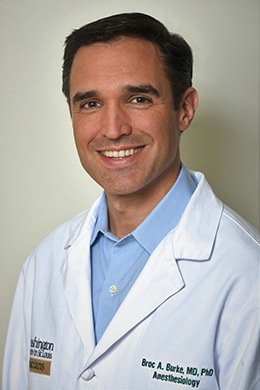Development of a Real-Time, Bedside, Brain Functional Connectivity Monitor
 Broc Burke, MD, PhD
Broc Burke, MD, PhDAssistant Professor, Anesthesiology
University of Colorado Anschutz Medical Center
Aurora, CO
As an instructor and cardiothoracic anesthesiology fellow at Washington University and Barnes Jewish Hospital in 2018, Broc Burke, MD, PhD, had developed a long-term goal to become an independent investigator in perioperative and critical care bedside neurological monitoring. He was able to apply practical experience as a Senior Staff Engineer/Scientist in real-time controls and signal processing, and with the backing of a mentoring committee, he succeeded to obtain a 2018 IARS Mentored Research Award for his investigation focused on “Development of a Real-Time, Bedside, Brain Functional Connectivity Monitor.” With this study, Dr. Burke set out to develop a non-invasive, quantitative measurement that correlates with the NIH stroke scale, a goal he reached successfully. The outcomes from this study propelled Dr. Burke forward in his career and helped him to obtain a competitive position at an academic anesthesia department at the University of Colorado Anschutz Medical Center, where today he serves as an Assistant Professor in Anesthesiology. At this new institution and in his new position, his research has shifted focus. While he is still using some of the computational techniques and optical techniques that he developed during his IMRA-funded study, his research questions have changed. However, his former lab continues to advance the development and application of the optical technology for patients with Parkinson’s Disease as well as autism, the research that he initially pursued back in 2018. The IMRA support opened opportunities for Dr. Burke to develop relationships with the research community in anesthesia, which has and will continue to be a critical resource during his career as an independent researcher. Below, he describes his research journey, how the IMRA impacted his research and career trajectory and his vision for the future of anesthesia research.
1. What is your current position? How long have you been in this position?
Assistant Professor, 2 years.
2. What was your role when you were first funded by IARS?
Instructor at Washington University/Barnes Jewish Hospital
3. What was the goal of your initial research project? Was it met?
The initial goal was to develop a non-invasive quantitative measurement that correlates with the NIH stroke scale. Yes, the goal was met.
4. How did your findings impact patient care?
My findings made it possible for me to obtain a competitive position at an academic anesthesia department.
5. How did your research impact the field of anesthesiology?
The results have the potential to improve the diagnosis and care of critically ill patients with, or at risk for, ischemic stroke.
6. Has your research subject area evolved since the award?
With my new position and institution, my research area has pivoted. While I am still using some of the computational techniques and am still using optical techniques, my research questions have changed. The lab that I worked in during my IARS grant has continued the development and application of the optical technology for patients with Parkinson’s Disease as well as autism.
7. How did the award affect your research/professional trajectory?
The award allowed me to develop relationships with the research community in anesthesia, which has and will continue to be a critical resource during my career.
8. How do you feel about having received the IARS Mentored Research Award?
The time and resources that the IARS Mentored Research Award provided were critical as I transitioned from my time as a trainee to an early-career clinical investigator.
9. What would you like to convey to our donors, the people who made this award possible?
The transition from trainee to attending is one of the greatest periods of attrition for clinical researchers. The support provided by IARS is critical to identifying and supporting this key group of researchers.
10. What drew you to academic anesthesiology and to your particular area of research?
Academic anesthesiology is arguably the most data rich specialty in medicine. Despite the amount of data available to anesthesiologists, the number of researchers using this data to improve the care of our patients is exceptionally low when compared to other specialties.
11. What do you hope for the future of anesthesia research?
With the surplus of clinical data and the diversity of patients that anesthesiologists care for, I am excited to see the increasing breadth of research topics and number of colleagues embracing research in our field.
“The transition from trainee to attending is one of the greatest periods of attrition for clinical researchers. The support provided by IARS is critical to identifying and supporting this key group of researchers.”
– 2018 IARS Mentored Research Award Recipient Broc Burke, MD, PhD
International Anesthesia Research Society
